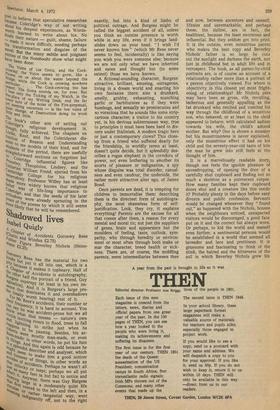S h adowed lives I sabel Quigly (Ch Cil ' a Pter of Accidents Goronwy ,tto
Windus £275) Pdtne and . r Rees a)a, , Fi gure Beverley Nichols (H -un C2.25) eine1;?0°,1;?11WY Rees has the material for is but put it all into one, which ifs c because it makes it tOPheavY' Hal h f, s7in13: Chapter of Accidents is autobiography, cither half the portrait of a friend, G.rn3r, ,rgess superspy (at least in his own i _ atien). And it is Burgess's large prethes 007 that dominates ...oin,nates it and overshadow p kreally worth hearing) rest of it. thrrIVIr Rees's accidents, their number r o can'requency, it is hard to account. You kno,saY he was accident-prone but we all viet." 1N'hat that means — nature's own ._ arldItti inviting rivers to flood, trees to fall he .happ2ns ightoing to strike just when ac ents iees_ Were Mostly man-ma t , __, iO tlyillade: in other words, he put his mho; de or even is a Ns. And this again is odd because he Mighstlpleildid describer and analyser, which .r and i seern to make him a good notice avoid°regeer of things, in other words an l jusa tht el' of accidents. Perhaps t unlucky or inept; perhaps h e wasn't a sanl 1 t a plkliniatsi Many feet in but fail to notice an ,Anyway, there was Guy Burgess that large in a moderately quiet life eiretpt veered to the left and then, in a tootrti4 or rather tangential way, went ng indignantly off, not to the right exactly, but into a kind of limbo of political outrage. And Burgess might be called the biggest accident of all, unless you think an outsize presence is worth while in any life, even if it brings landslides down on your head. "I wish I'd never known him" (which Mr Rees never seems to feel, incidentally) is like saying you wish you were someone else; because we are not only what we have inherited and eaten and thought but (to some extent) those we have known.
A fictional-sounding character, Burgess: attractive, brilliant, amusing, outrageous, living in a dream world and enacting his own fantasies there; also a drunkard, smelly, grubby, exhausting, munching garlic or barbiturates as if they were humbugs, and sexually so promiscuous and so voracious that he sounds like some stripcartoon character; a traitor to his country yet, in his devious subterranean way, true to principles it must have been hard to discern under Stalinism. A modern tragic hero or just a contemporary clown? This closeup from a friend who suffered dearly for the friendship, in worldly terms at least, doesn't quite decide, but it splendidly describes a rogue elephant in the corridors of power, not even bothering to smother its snorts of pleasure or indignation, a spy whose disguise was total disorder, casualness and even candour, the underside, the rather more attractive alter ego, of James Bond.
Once parents are dead, it is tempting for children to immortalise them: describing them is the directest form of autobiography, the most shameless form of selfjustification. Look, they cry, it explains everything! Parents are the excuse for all that comes after them, a reason for every mental and moral tic; not just the suppliers of genes, brain and appearance but the moulders of feeling, taste, outlook, sympathy, who through heredity or environment or most often through both make or mar the character, breed health or sickness. There are, of course, the middling parents, mere intermediaries between then and now, between ancestors and oneself, lifesize and unremarkable; and perhaps these, the dullest, are in fact, the healthiest, because the least enormous and influential. But they seldom get into print. It is the outsize, even monstrous parent who makes the best copy and Beverley Nichols' father is so large he cuts out the sunlight and darkens the earth, not just in childhood but •in adult life and in retrospect. The book, as all parent-by-child portraits are, is of course an account of a relationship rather more than a portrait of a person objectively viewed. For where is objectivity in this closest yet most frightening of relationships? Mr Nichols pere may have been as gross, vile, revolting, lecherous and generally appalling as the fat drunkard who retched and vomited his way through the childhood of a sensitivie son, who behaved, or at least to the child appeared to behave, with calculated sadism towards his wife, the child's adored mother. But why? One is shown a monster but his monstrousness is never explained, only the monstrous effect it had on his child and the seventy-year-old taste of bile the man he grew into still feels at the thought of him.
It is a marvellously readable story, though one feels the ignoble pleasure of eavesdropping, of opening the door of a carefully shut cupboard and finding not so much a skeleton as a putrescent corpse. How many families kept their cupboard doors shut and a creature like this inside it? Probably plenty in the days before easy divorce and public confession. Servants would be changed whenever they "found out," as happened with the Nichols, houses when the neighbours noticed, unexpected visitors would be discouraged, a good face put on it and the correct hat always worn. Or perhaps, to kid the world and oneself even further, a sentimental persona would be established in a world that seemed all lavender and lace and prettiness. It is gruesome and fascinating to think of the stink, the hatred and the bitterness of the soil in which Beverley Nichols grew his










































 Previous page
Previous page